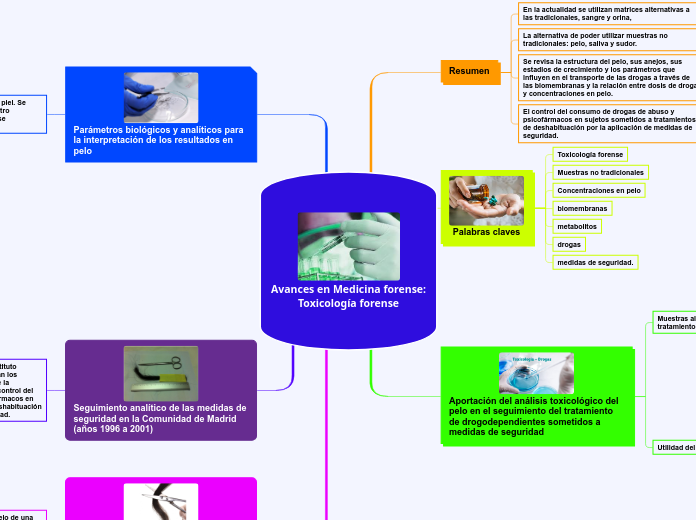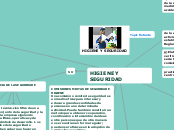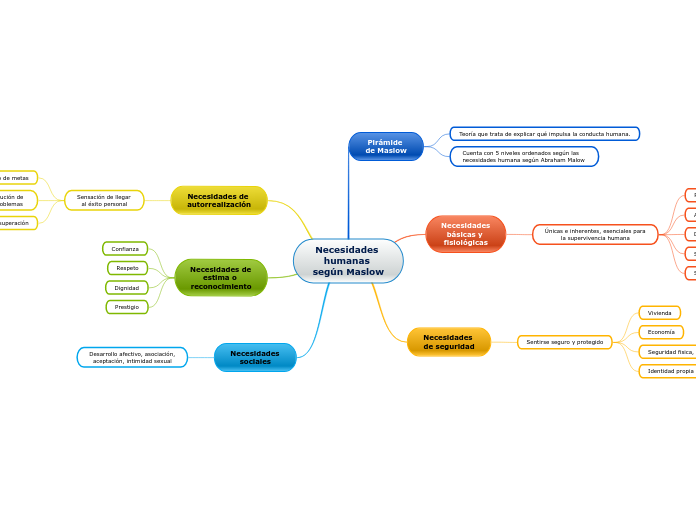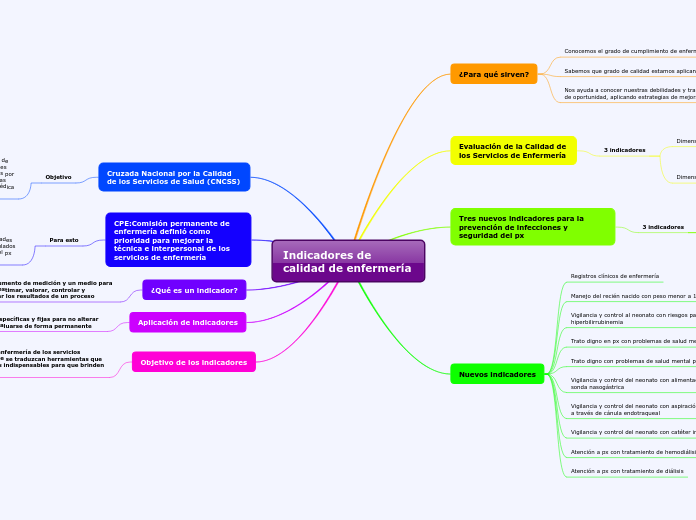Cocaína
Drogas
Toxicología
Avances en Medicina forense:
Toxicología forense
The part of speech is a category to which a word is assigned according to its syntactic functions. In English the main parts of speech are noun, pronoun, adjective, determiner, verb, adverb, preposition, conjunction, and interjection.
Utilidad del análisis del pelo en el conocimiento de perfiles
de consumo evolutivos
A conjunction is a word like 'if' 'but' or 'and' which is used to connect sentences or clauses together.
El análisis de fragmentos seriados de pelo de una misma muestra y de muestras sucesivas tomadas a lo largo del tiempo nos permite conocer el tipo de sustancias consumidas, la intensidad del consumo a lo largo del tiempo y la variación de drogas en la evolución temporal.
Coordinating conjunctions always connect phrases, words, and clauses. They are: for, and, nor, but, or, yet, so.
Perfil analítico evolutivo
Perfil analítico en orina antes del tratamiento
Se trata de un varón sometido a tratamiento (medida de seguridad) con metadona.
Consumo de heroína fumada
Se trata del caso de un varón en cuyo perfil analítico en pelo observamos la presencia de opiáceos.
Perfil toxicológico de consumo evolutivo
Se trata de una mujer cuya muestra de 22 cm de longitud permite detectar opiáceos y cocaína/benzoilecgonina.
Seguimiento analítico de las medidas de seguridad en la Comunidad de Madrid (años 1996 a 2001)
A preposition is one of the most exciting parts of grammar. A preposition is used to describe the location of something in relation to something else.
En el Laboratorio de Toxicología del Instituto Anatómico Forense de Madrid se realizan los análisis de las muestras procedentes de la Audiencia Provincial de Madrid para el control del consumo de drogas de abuso y psicofármacos en sujetos sometidos a tratamientos de deshabituación por la aplicación de medidas de seguridad.
A group of words used with the force of a single preposition is called phrase preposition.
Comparación de nuestra serie con las de otros autores
Comparación ratios teóricos (cut-off) y en nuestra muestra Ratios teóricos, Ratios reales mínimos y medios
Comparación resultados de metadona en pelo
Comparación resultados de codeína en pelo
Comparación resultados de morfina en pelo
Comparación resultados de benzoilecgonina en pelo
Comparación resultados de cocaína
Parámetros biológicos y analíticos para
la interpretación de los resultados en pelo
A numeral is a word or phrase that describes a numerical quantity.
Some theories of grammar use the word 'numeral' to refer to cardinal numbers that act as a determiner to specify the quantity of a noun, for example the 'two' in 'two hats'.
Pelo es un tejido complejo y anejo de la piel. Se origina en el folículo piloso en cuyo centro germinativo existen células madre que se encuentran en proliferación activa.
5. Predisposición de las drogas (disposición) en el análisis de pelo.
Garantía de calidad
Influencia de las técnicas analíticas en la interpretación
Tratamientos cosméticos del pelo
Predisposición por contaminación pasiva
Predisposición racial
4. Intervalo de tiempo de aparición de las drogas en pelo
El pelo de la barba es una muestra interesante que crece a un ritmo similar al cabello y puede ser recogido diariamente. Se ha utilizado este pelo para evaluar el tiempo de aparición de una droga administrada en una dosis única y ello se ha llevado a efecto para algunas sustancias en concreto.
3. Relación entre dosis de droga y concentraciones en pelo
Este es otro importante parámetro a considerar. Se han hecho algunos intentos para relacionar concentraciones en pelo de drogas y las dosis consumidas de las mismas.
2. Ratios entre metabolitos y drogas originarias para la interpretación de los resultados en pelo
Cone
Ratio benzoilecgonina /cocaína > 0,05 para indicar uso de cocaína.
Gaillard y Pépin
Ratios que indican consumo de la droga (cocaína o heroína):
— benzoilecgonina/cocaína > 0,10
Moeller
Para determinar el consumo de heroína el ratio de concentraciones detectadas en pelo entre morfina/codeína ha de ser 5:1 cuando se
trata de niveles bajos de morfina.
1. Niveles de corte (valores cut-off) y frecuencia de consumo.
Los valores cut-off son de la mayor importancia para la interpretación de los resultados en pelo.
Aportación del análisis toxicológico del pelo en el seguimiento del tratamiento de drogodependientes sometidos a medidas de seguridad
A pronoun is a word that can be used in place of a noun, typically after the noun itself has already been stated.
Utilidad del análisis del pelo en Toxicología forense
Possessive pronouns are used to show possession. The possessive pronouns are mine, yours, his, hers, ours, and theirs.
Control de los tratamientos bajo tutela judicial (medidas de
seguridad).
Delitos contra la salud pública.
Exposición prenatal.
Responsabilidad criminal (imputabilidad).
Licencias para conductores, cazadores, etcétera.
Muertes relacionadas con drogas.
Muestras alternativas para el control de los tratamientos
The personal pronouns are I, you, he, she, it, we, they. More often than not (but certainly not always), they replace nouns representing people.
En diversos países se están haciendo determinaciones de drogas y psicoactivos en fluido oral (saliva) de conductores para conocer su influencia.
Se utilizan matrices alternativas a las tradicionales, sangre y orina, de modo que la detección de drogas en trabajadores se realiza ocasionalmente en pelo.
Palabras claves
A noun is defined as a person, place, thing or idea. Proper nouns always begin with a capital letter. Common nouns, which are general words, such as 'cars,' are not capitalized.
medidas de seguridad.
Compound nouns are words where two nouns have been stuck together to make a new noun. Compound nouns should be written as one word, without a hyphen.
drogas
A noun which refers to a group of things/people.
metabolitos
biomembranas
Countable nouns are nouns that can be counted, even if the number might be extraordinarily high.
Uncountable nouns are nouns that come in a state or quantity which is impossible to count; liquids are uncountable, as are things which act
like liquids.
Concentraciones en pelo
Muestras no tradicionales
Toxicología forense
Proper nouns are the names of specific people or places. They should always begin with a capital letter.
Resumen
A verb is an action word or 'doing' word that signifies movement in some way.
El control del consumo de drogas de abuso y psicofármacos en sujetos sometidos a tratamientos de deshabituación por la aplicación de medidas de seguridad.
A participle is a verb form that can be used as an adjective or to create a verb tense. There are two types of participles: Present participle (ending -ing) and Past participle (usually ending -ed, -d, -t, -en, or -n).
Se revisa la estructura del pelo, sus anejos, sus estadios de crecimiento y los parámetros que influyen en el transporte de las drogas a través de las biomembranas y la relación entre dosis de droga y concentraciones en pelo.
A modal is a type of auxiliary (helping) verb that is used to express: ability, possibility, permission or obligation. The main modal verbs in the English language are: can, could, may, might, must, shall, should, will, would.
La alternativa de poder utilizar muestras no tradicionales: pelo, saliva y sudor.
A linking verb connects the subject with a word that gives information about the subject, such as a condition or relationship.
En la actualidad se utilizan matrices alternativas a las tradicionales, sangre y orina,
A verb with its own meaning: a verb that is not an auxiliary verb.









